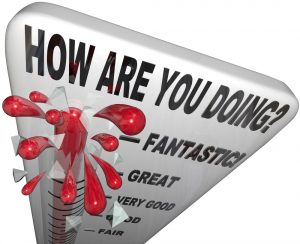Is a 'quantified self' the best way forward?
 Through smartphone apps and wearable technology we can monitor virtually every aspect of our lives, gathering information about our habits and tracking behavior to discover patterns and trends.
Through smartphone apps and wearable technology we can monitor virtually every aspect of our lives, gathering information about our habits and tracking behavior to discover patterns and trends.
This so-called "quantified self" movement is seen as a clever and efficient way to enhance our lives -- getting one’s body, mind and behavior in their best possible shape.
And yes, you can become more enlightened by using technology to track data related to exercise, diet, health, money and more. But I also recently discovered that you can also become a nervous wreck, obsessed by data telling you where you’re going wrong.
I decided to spend two weeks monitoring myself using various quantified self apps for my Samsung Galaxy S4.
Fourteen days later and my early appreciation of such insightful technology had dissolved into tears and frustration at statistics and facts. I’d become frazzled, obsessed and slightly narcissistic.
It started with assessing my finances. What with today's uncertain economic environment, I thought I’d monitor my outgoings using personal finance manager and expense tracker Toshl Finance, which is designed to make it super easy to track your spending on the go. As the two weeks progressed I learned that I have a problem with spending money when I don’t have any. This made me anxious.
I tried MySleepBot, which lets you track your sleep patterns, as I thought it would be useful to know how much sleep I wasn’t getting thanks to living with two small children and an occasional snoring partner. And so, it would appear that I am indeed an insomniac. Although it’s debatable whether I was an insomniac before or if I had only became one after I continually woke during the night to check my phone obsessively to see how long (or little) sleep I’d just managed?
Turning to RescueTime, which helped me track my productivity over the fortnight. It works by observing how long you spend using your mobile apps and phone calls so it can work out your top distractions. It told me that I use Facebook far more than is necessary and I need to lay off Twitter too -- but I knew that already. If only it had told me to stay away from Google Play Store and to stop downloading all these self-monitoring apps.
So when it came to MoodPanda, the app that helps you track your mood, I didn’t really need its help. One nice visual feature of this app is the graph charting your mood history over the week. I started at 9 on the happiness scale (Very Happy) and by the end of the two weeks, I was unsurprisingly down to a lowly score 2 (a rating that sits between Unhappy and Very Unhappy). This self-tracking was getting me down.
OK, I am probably overegging the negativity here and I’d be lying if I didn’t find the Calorie Counter by MyFitnessPal particularly useful for keeping track of the food I ate. It was gratifying to see how well I was doing in my whole "New Year, New You" approach to 2014 but then January is the month where you dare to dream of a healthier lifestyle, so if I still like the app when my resolve is slipping, I’ll be very surprised.
But look, I’m not usually a Luddite when it comes to modern technology, and in truth, I fully expect that the quantified self movement will become a highly efficient way to monitor important health issues.
We will no doubt all have apps or devices that will keep track of our heart rate, blood sugar levels or our oxygen intake and alert us when something goes awry, giving us the ability to diagnose and find instant treatments. But for now, I think I need to give the self-analysis a bit of a rest.
I’d love to know what quantified self apps you use and can recommend.
Image Credit: iQoncept/Shutterstock